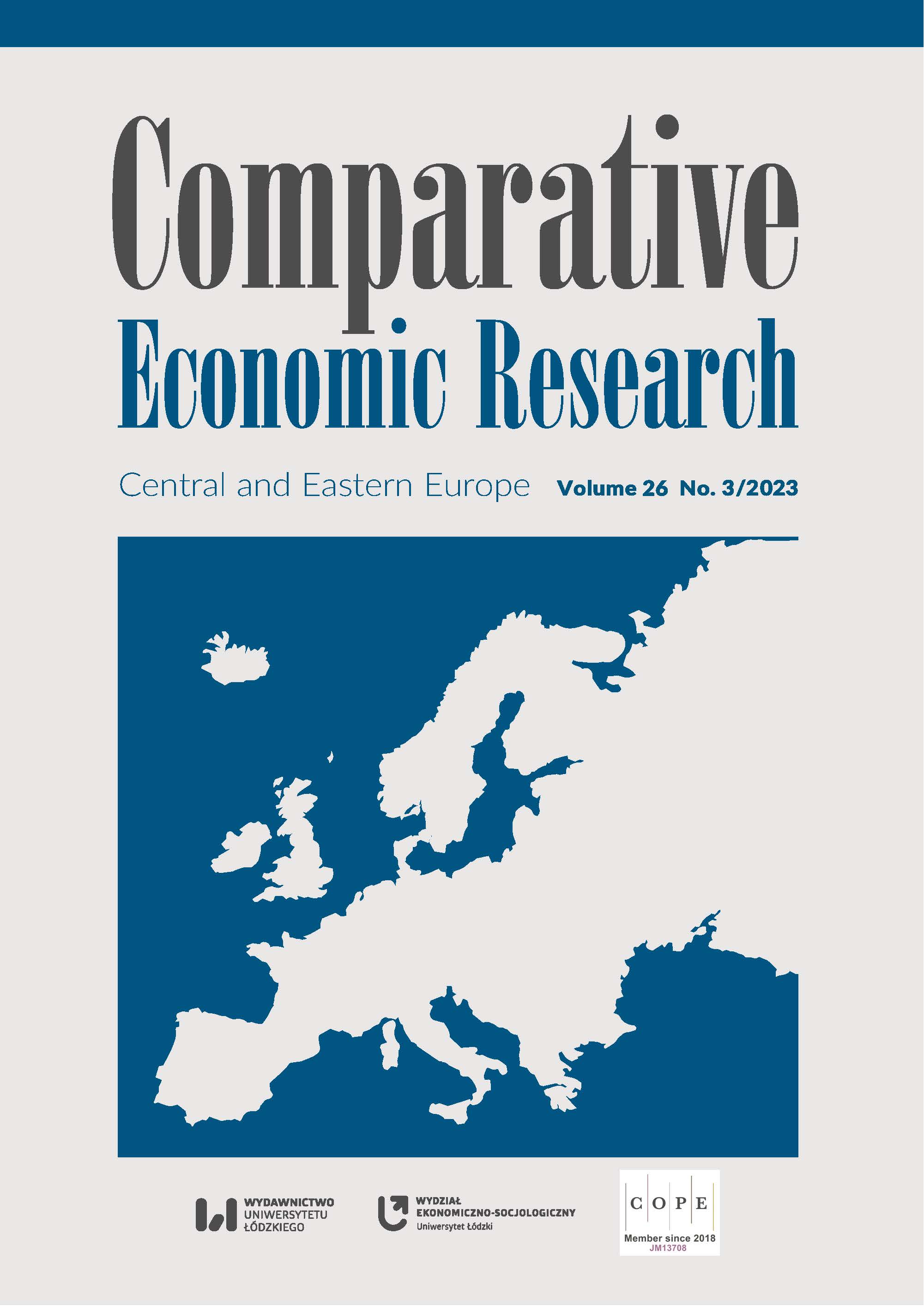The Mundell‑Fleming Model and Macroeconomic Stabilization Policies
DOI:
https://doi.org/10.18778/1508-2008.26.25Keywords:
policy rules, monetary policy autonomy, fiscal policy settingAbstract
This paper analyzes the fiscal policy implications set in the Mundell‑Fleming (M‑F) model and its effectiveness in emerging economies. It also widens the scope of the policy mix with alternative exchange rates. The empirical evidence about the economies of Chile (1991–2003) and Colombia (1994–2004), about institutions, fiscal policy rule, and the eurozone conditions (1999), were considered relevant The paper has three sections a. The budget‑surplus fiscal policy rule and policy effectiveness, b. The role of institutions in setting policy rules, c. The experience of the Chilean and Colombian economies concerning fiscal policy rules within the M‑F framework. The main conclusion is that as long as country risk is lower due to countercyclical fiscal policy rules, governments have an alternative means of getting funds at a lower international interest rate. The fiscal policy effect on GDP (output)becomes positive.
Downloads
References
Bassetto, M. (2005), Equilibrium and government commitment, “Journal of Economic Theory”, 124 (1), pp. 79–105, https://doi.org/10.1016/j.jet.2004.06.001
Google Scholar
DOI: https://doi.org/10.1016/j.jet.2004.06.001
Calderon, C., Duncan, R., Schmidt-Hebel, K. (2004), Institutions and Cyclical properties of Macroeconomics policies, “Working Papers”, 285, Central Bank of Chile, https://dialnet.unirioja.es/descarga/articulo/1064721.pdf (accessed: 1.12.2021).
Google Scholar
Central Bank of Chile (2001), Macroeconomics indicators 1974–2000, http://www.bcentral.cl (accessed: 1.12.2021).
Google Scholar
Céspedes, L., Soto, C. (2005), Credibility and Inflation target in an emerging economy: The case of Chile, “Working Papers”, 312, Central Bank of Chile, https://dialnet.unirioja.es/descarga/articulo/1160643.pdf (accessed: 1.12.2021).
Google Scholar
De Gregorio, J. (2001), Macroeconomia, Princeton.
Google Scholar
Ennis, H. (2007), Complementariedades y política macroeconómica, [in:] D. Heymann (ed.), Progresos en Macroeconomía, Asociación Argentina de Economía Política, Buenos Aires, pp. 1–34.
Google Scholar
Favero, C., Monacelli, T. (2005), Fiscal Policy Rules and Regime (In)Stability: Evidence from the U.S., “IGIER Working Papers”, 282, https://doi.org/10.2139/ssrn.665506
Google Scholar
DOI: https://doi.org/10.2139/ssrn.665506
Fuentes, J., Schmidt-Hebel, K., Soto, S. (2021), Fiscal Policy Rule and public investment in Chile, “IDB Working Paper Series”, 1189, https://doi.org/10.18235/0003105
Google Scholar
DOI: https://doi.org/10.18235/0003105
Garcia, C. (2008), Inflación y crecimiento económico después de la intervención cambiaria, “Observatorio Económico”, 16, pp. 1–8, https://doi.org/10.11565/oe.vi16.306
Google Scholar
DOI: https://doi.org/10.11565/oe.vi16.306
Grûnwald, C. (2018), Regla fiscal y su evolucion, Serie Informe económico, Instituto Libertad y Desarrollo, Santiago.
Google Scholar
International Monetary Fund (2017), Fiscal Rules at a Glance, Washington, https://www.imf.org/external/datamapper/fiscalrules/Fiscal%20Rules%20at%20a%20Glance%20-%20Background%20Paper.pdf (accessed: 1.12.2021).
Google Scholar
Lozano, L. (2010), La regla fiscal y su papel estabilizador en Colombia: ¿qué se vislumbra en los próximos años?, “Finanzas y Política Económica”, 2 (1), pp. 9–28.
Google Scholar
Maitra, S. (2017), Open Economy IS-LM Model. The Mundell-Fleming Model, https://www.researchgate.net/publication/343655000 (accessed: 15.11.2021).
Google Scholar
Moreira, F., Mendonca, M., Sachsida, A. (2021), Fiscal and monetary policy rules in Brazil: empirical evidence of monetary and fiscal dominance, “CEPAL Review”, 135, pp. 81–104, https://repositorio.cepal.org/bitstream/handle/11362/47818/1/RVI135_Moreira.pdf (accessed: 20.10.2021).
Google Scholar
DOI: https://doi.org/10.18356/16840348-2021-135-4
New Zealand Government (2015), An Introduction to New Zealand’s Fiscal Policy Framework, https://www.treasury.govt.nz/sites/default/files/2015-03/nzfpf-A5.pdf (accessed: 20.10.2021).
Google Scholar
Piasecki, R., Wulf, E. (2014), Fiscal policy Rules. Evidence from Chilean Economy, “Review of Business & Finance Studies”, 5 (2), pp. 45–54.
Google Scholar
Sachs, J., Larrain, F.B. (2003), Macroeconomics in the Global Economy, Pearson College.
Google Scholar
Statista (n.d.), http://www.statista.com (accessed: 3.02.2022).
Google Scholar
Stokey, N. (1991), Credible public policies, “Journal of Economics Dynamics and Control”, 15, pp. 627–656, https://doi.org/10.1016/0165-1889(91)90036-Z
Google Scholar
DOI: https://doi.org/10.1016/0165-1889(91)90036-Z
Vargas, H. (2005), Exchange rate Policy and inflation targeting in Colombia, “Inter-American Development Bank. Working Paper”, 539, pp. 1–40.
Google Scholar
Wang, P. (2005), The Mundell-Fleming Model, [in:] P. Wang, The Economics of Foreign Exchange and Global Finance, Springer, Berlin–Heidelberg, pp. 103–130, http://doi.org/10.1007/3-540-28524-5_6
Google Scholar
DOI: https://doi.org/10.1007/3-540-28524-5_6
Wolnicki, M., Piasecki, R. (2021), New Challenges Facing the Global Economy, University of Lodz, Lodz.
Google Scholar
DOI: https://doi.org/10.18778/8220-607-4
World Bank (2020), World Development Indicators Database, Washington D.C.
Google Scholar
Downloads
Published
How to Cite
Issue
Section
License

This work is licensed under a Creative Commons Attribution-NonCommercial-NoDerivatives 4.0 International License.











